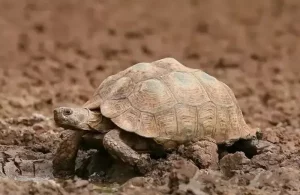Tortoises are popular pets and are known for their longevity and resilience. They are also herbivores, meaning that their diet consists mainly of plant material. In the wild, tortoises have access to a variety of vegetation, but in captivity, it’s important to ensure that they receive a well-balanced diet that meets all their nutritional needs. One important aspect of this is ensuring that they eat the right fruits.

Fruit is an important part of a tortoise’s diet as it provides a good source of vitamins, minerals, and antioxidants. However, not all fruits are suitable for tortoises. Some fruits contain high levels of sugar and can cause digestive problems or obesity. Others are toxic and can be deadly to tortoises.
What fruits can a tortoise eat?
Apples:
Apples are a good source of vitamins A and C and fiber. They should be fed in moderation, and the seeds should be removed as they contain small amounts of cyanide, which can be harmful to tortoises.
Bananas:
Bananas are a good source of potassium, fiber, and vitamin C. They should be fed in moderation as they are high in sugar.
Berries:
Berries such as strawberries, raspberries, and blueberries are a good source of vitamin C and antioxidants. They can be fed in moderation.
Melons:
Melons such as cantaloupe and watermelon are a good source of vitamins A and C and are low in sugar. They can be fed in moderation.
Papaya:
Papaya is a good source of vitamins A and C and is also rich in enzymes that aid in digestion. It should be fed in moderation.

Mango:
Mango is a good source of vitamins A and C and is also rich in fiber. It should be fed in moderation as it is high in sugar.
Kiwi:
Kiwi is a good source of vitamin C and fiber. It should be fed in moderation.
Here are some fruits that tortoises should avoid:
Citrus fruits:
Citrus fruits like oranges, lemons, and grapefruit are too acidic for tortoises and can cause digestive problems. These fruits should be avoided.
Rhubarb:
Rhubarb contains high levels of oxalic acid, which can bind with calcium and cause kidney damage. Tortoises should avoid eating rhubarb and any other plants that contain oxalic acid.
Grapes and raisins:
Grapes and raisins can cause kidney failure in tortoises. It is recommended to avoid feeding these fruits to tortoises.
Persimmons:
Persimmons contain high levels of tannins, which can cause digestive problems and blockages in tortoises. It is recommended to avoid feeding persimmons to tortoises.
Tomato:
Tomatoes contain a substance called solanine, which can be toxic to tortoises. Consumption of tomatoes can cause gastrointestinal distress, tremors, and even death in tortoises.

Avocado:
Avocado contains persin, which can be toxic to tortoises. Consumption of avocado can cause respiratory and cardiovascular problems in tortoises.
Cherry:
Cherries contain cyanide in their seeds, which can be harmful to tortoises if ingested. It is recommended to remove the seeds before feeding cherries to tortoises.
It’s important to remember that fruit should only make up a small part of a tortoise’s diet, and a variety of fruits should be offered in moderation. Tortoises also require a diet that includes a variety of vegetables and leafy greens, as well as a calcium source, such as cuttlebone or calcium powder.
In conclusion, tortoises can eat a variety of fruits, but it’s important to ensure that the fruits offered are safe and suitable for their dietary needs, there are some fruits that they should avoid. Always consult with a veterinarian or a reptile specialist to ensure that your tortoise’s diet is well-balanced and meets all their nutritional needs.
























